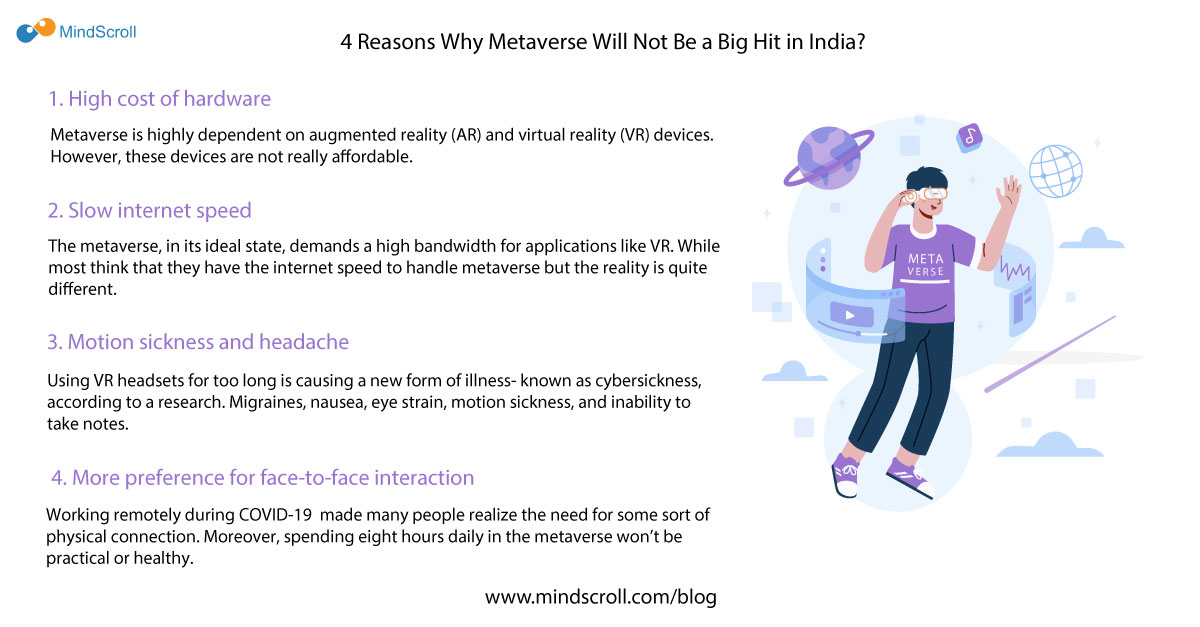We keep hearing about the term Metaverse, especially after Mark Zuckerberg, the CEO of Facebook, invested hugely in this technology and renamed Facebook to Meta in 2021. However, just immersing yourself in virtual reality (VR) and augmented reality (AR) doesn’t automatically make it more interesting.
In India, Metaverse was adopted by gaming and entertainment sectors with AR-VR headsets, flooding malls and public spaces. However, a massive impact is yet to be seen. The initial interest quickly went away and the few years of the pandemic resulted in most of such VR outlets closing down. Listed below are some of the reasons why Metaverse will not be a big hit in India:
1. High cost of hardware
Metaverse is highly dependent on augmented reality (AR) and virtual reality (VR) devices. However, these devices are not really affordable. For example, Oculus Quest, a VR headset developed by Meta (Facebook), is very expensive. And very soon the price of Oculus Quest 2 will increase further by 8215.25 INR. There will also be a price hike in its accessories and refurbished units. The current price of Oculus Quest 2 is 32774.66 INR for the 128GB model and 40988.86 for the 256GB model. However, despite the price rise, there are hardly any hardware improvements.
While the company, Meta, feels that this price rise will help drive the VR industry, it has actually created barriers to consumer adoption of technology. Moreover, even though many people may be excited about the concept of Metaverse, only a few use any kind of VR environment. Hence, for now it seems like metaverse is far away in hardware accessibility and it may take years to develop high quality and affordable VR devices for immersive experiences.
2. Slow internet speed
The metaverse, in its ideal state, demands a high bandwidth for applications like VR. While most think that they have the internet speed to handle metaverse but the reality is quite different. With a fixed broadband mean speed of 71.79 megabits per second (Mbps), India ranked 80th out of a total of 182 countries (Ookla Global Index-June 2022). Even though the broadband infrastructure in India has improved, experts say that a minimum of 1 gigabit per second (Gbps) speed is needed for the best metaverse experience.
Besides, many telecom companies struggled with the increased demand for bandwidth at the start of COVID-19. While this issue has stabilized, there is no doubt that metaverse will place a lot of strain on the network. Moreover, since networks are oversubscribed, the internet speed can differ significantly depending on how many users are competing for bandwidth at a certain point of time. Carriers also continue to experience high operating costs, while there is no sign of the average revenue per user increasing anytime soon.
Further, broadband speeds are not symmetrical by design. Many users get faster download speeds compared to their upload speeds. In our daily lives, we usually do not notice the variation in speeds as most of the applications we use depend on the download speeds. But as we enter the new age of hybrid working, applications like web conferencing and workplace collaboration tools will demand bandwidth. The metaverse will be just the same, demanding not just more download speed but also more upload speed.
3. Motion sickness and headache
Using VR headsets for too long is causing a new form of illness- known as cybersickness, according to a research. Migraines, nausea, eye strain, motion sickness, and inability to take notes are just a few of the negative impacts of Metaverse. The study found that participants had a pretty uncomfortable experience with Meta Quest 2 headsets. An increase in frustration and anxiety along with lower perceived productivity and decrease in feelings of well-being was seen in most participants. Many users also reported low usability scores and reduced typing speed while using VR.
Furthermore, to make VR more accessible and affordable, companies are making smaller devices and running them on less powerful processors. This in turn is leading to dizzying graphics, causing people to experience cybersickness. Even taking a 10-15 minute break every half an hour as experts recommend is not giving most users enough time to recover. Hence, it is clear that there is still a long way to go for the development of comfortable hardware. Until then, cybersickness will be a major obstacle in the adoption of Metaverse.
4. More preference for face-to-face interaction
Face-to-face interaction is a fundamental part of being human. Working remotely during the COVID-19 pandemic made many people realize the need for some sort of physical connection. Besides, for many of us, the office is not just a place to work. It is where people collaborate, socialize, work as a team, and build long-lasting relationships.
Moreover, spending eight hours daily in the metaverse won’t be practical or healthy. It can lead to several health issues such as insomnia, depression, sleep deprivation, circadian rhythm disorders, and more. Overall, spending too much time in the virtual world can have negative effects on a person’s physical and mental well-being.
People also have different working styles. Some are more productive and creative at home, while others are more motivated and focused at the workplace. So, working in the virtual workplace in the metaverse may not work for everyone.
Plus with the hybrid work model, it seems like the metaverse won’t replace the physical workplace. But it can bridge the gap between virtual and physical environments to create a more engaging and immersive experience. However, it can never replace the physical office and the basic need for face-to-face communication.
Final Word
We hope this article clearly expressed our thoughts on the reasons why Metaverse will not be a big hit in India. Even though this technology certainly has some positive and transformative uses that are yet to be seen, it still has a very long way to go before it becomes a part of our daily lives. And as the virtual technology further matures and improves, Metaverse will remain a niche technology mainly inaccessible to the majority of people. Moreover, contrary to Mark Zuckerberg’s belief, we won’t be living in the Metaverse as it will always be of a lesser value than the physical world.
Learn more on www.mindscroll.com. Learn more about MindScroll’s features here. For any queries, feel free to reach out to us at yg@infonative.net.
Do you like this blog post? Do you know of any other reasons why Metaverse won’t be a big hit in India? Tell us your thoughts or share this blog post on our social media platforms below:
Facebook (@MindScroll) | Twitter (@mindscroll_lms) | LinkedIn (@MindScroll) | Instagram (@mindscroll_lms)
Check our articles for resources you and your team may need.
Read next: How To Quickly Upskill and Reskill Your Employees in a Post COVID-19 World?




